SERMONS
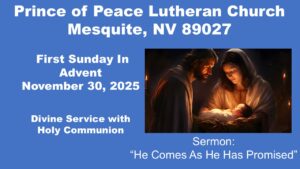
Old Testament Reading Isaiah 2:1-5
Epistle Reading Romans 13:8-14
Gospel Reading Matthew 21:1-12
The Lord Comes in Meekness and Humility
to Save Us Now
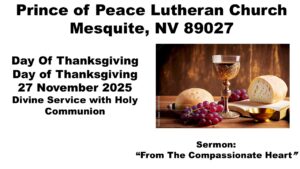
DAY OF THANKSGIVING
(27 November 2025)
Old Testament Reading Deuteronomy 8:1-10
Epistle Reading Philippians 4:6-20
Gospel Reading Luke 17:11-19
We Praise God for Sustaining Life in and through His Word
The nation resounds with thanksgiving for the earth’s bountiful harvest, crops of wheat and grains, all beneath the canopy of God’s almighty care. But “man does not live by bread alone, but man lives by every word that comes from the mouth of the Lord” (Deut. 8:3). The Church is the vessel through which the Word of God penetrates the world with its Law and Gospel. It is this divine Word that proclaims Jesus as the sole source of life, health and wholeness. It is Jesus who heals lepers with His Word: “Go and show yourselves to the priests” (Luke 17:14). Of the 10 cleansed, only one expresses thanksgiving to Jesus. But true gratitude proceeds from a heart sustained by faith. Jesus bids this one Samaritan to “rise and go your way; your faith has made you well” (Luke 17:19). So also, we are sent from the Divine Service, bolstered in our faith by baptismal and Eucharist blessing to be thankful in our circumstances of plenty and hunger, abundance and need (Phil. 4:6–20).
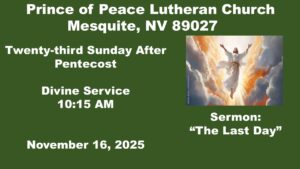
LAST SUNDAY OF THE CHURCH YEAR
(Proper 29C)
(23 November 2025)
Old Testament Reading Malachi 3:13-18
Epistle Reading Colossians 1: 13-20
Gospel Reading Luke 23:27-43
Jesus Christ Reigns, Enduring the Cross — Its Scorn and Shame
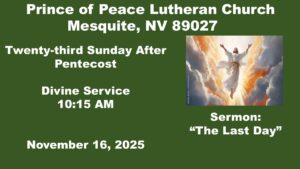
(Proper 28C)
16 November 2025
Old Testament Reading: Malachi 4:1-6
Epistle: 2 Thessalonians 3:1-13
God’s Plan of Redemption Trumps Earthly Destruction and Violence
There are signs of the Lord’s coming all around: the cross that marks His Church, the violence and death of the sinful world, and the shaking of the natural order. “There will be great distress upon the earth” (Luke 21:23), but the faithful know that “the kingdom of God is near” (Luke 21:31). Therefore, “straighten up and raise your heads, because your redemption is drawing near” (Luke 21:28). Be awake and alert, and heed the words of Christ, which “will not pass away” (Luke 21:33). For you, “the sun of righteousness shall rise with healing in its wings” (Mal. 4:2). He sends His preachers of repentance in the spirit and power of Elijah “before the great and awesome day of the Lord comes” (Mal. 4:5), in order to “direct your hearts to the love of God and to the steadfastness of Christ” (2 Thess. 3:5). Although you are often faithless, “the Lord is faithful,” and by the preaching of His Word “he will establish you and guard you against the evil one” (2 Thess. 3:3). Therefore, “do not grow weary in doing good” (2 Thess. 3:13). In the midst of calamity, believe upon the Lord, Jesus Christ.
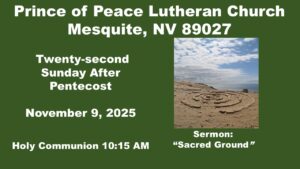
(Proper 27C)
9 November 2025
Old Testament Reading: Exodus 3:1-15
Epistle: 2 Thessalonians 2:1-8, 13-17
The Triune God Curbs Evil and Overcomes Death with Resurrection
Christians live as “sons of God, being sons of the resurrection” (Luke 20:36), for the Lord our God “is not God of the dead, but of the living” (Luke 20:38). “Those who deny that there is a resurrection” (Luke 20:27) neither know the Scriptures nor the power of God, but the baptized faithful know “that the dead are raised” (Luke 20:37). For the Lord, who was and is and is to come, knows Israel’s sufferings and has “come down to deliver them” (Ex. 3:8). Moses reveals the name of Yahweh to God’s chosen people, by which He is “remembered throughout all generations” (Ex. 3:15). In contrast to that sacred remembrance of His name, St. Paul warns against the antichrist, who “takes his seat in the temple of God” (2 Thess. 2:4). That lawless man preaches and practices the activity of Satan. Christians, however, are comforted by the coming of the Lord Jesus, who slays the antichrist and refutes his false doctrine “with the breath of his mouth” (2 Thess. 2:8). By His preaching, “stand firm and hold to the traditions that you were taught” (2 Thess. 2:15). Hear, receive and believe God’s promise of love, comfort and good hope.
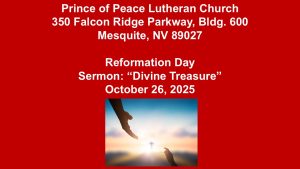 REFORMATION DAY
REFORMATION DAY(Proper 25C)
26 October 2025
First Reading: Revelation 14:6–7
Epistle: Romans 3:19-28
Gospel: John 8:31-36
The Son of God Has Set Us Free from Sin and Death by His Grace
“Wisdom is justified by her deeds” (Matt. 11:19), and the true Wisdom of God, Christ Jesus, the incarnate Son, justifies us by His deeds. He prepares His way by the preaching of repentance, but He has suffered the violence of the Law and voluntarily handed Himself over to violent men, that we might eat and drink with Him in His kingdom and “remain in the house forever” (John 8:35). For He is “a friend of tax collectors and sinners” (Matt. 11:19), and He has rescued us by His grace from the slavery of sin and death. By the proclamation of His eternal Gospel “to those who dwell on earth, to every nation and tribe and language and people” (Rev. 14:6), “the righteousness of God has been manifested apart from the law” (Rom. 3:21), “that he might be just and the justifier of the one who has faith in Jesus” (Rom. 3:26). And by hearing the Gospel of Christ Jesus, “whom God put forward as a propitiation by his blood, to be received by faith” (Rom. 3:25), “you will know the truth, and the truth will set you free” (John 8:32).
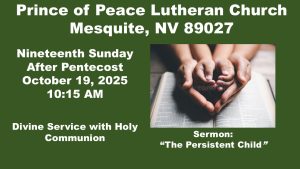
NINETEENTH SUNDAY AFTER PENTECOST
(Proper 24C)
19 October 2025
Old Testament: Genesis 32:22–30
Epistle: 2 Timothy 3:14–4:5
Gospel: Luke 18:1–8
Faith Clings to the Word and Promises of God and Perseveres in Prayer
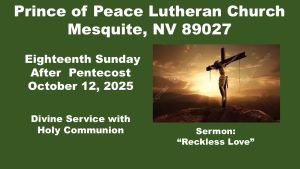
Jesus comes in mercy and, by His Word, heals you in body and soul. “Go and show yourselves to the priests,” for you are cleansed (Luke 17:14), and you are granted access to the Lord’s temple. It is “at Jesus’ feet, giving him thanks” (Luke 17:16), that you worship God, for Christ Jesus is your great High Priest; His body is the true temple. In Him, you “find rest, each of you in the house of her husband” (Ruth 1:9), for the Lord has “visited his people and given them food” (Ruth 1:6). The person of Jesus Christ lodges Himself in holy food — bread and wine for believers to eat and drink. You lodge where Jesus lodges; His Father is your God, His people are your people. Death cannot part you from Him because His death and resurrection are eternally yours through Holy Baptism. “Remember Jesus Christ, risen from the dead” (2 Tim. 2:8). As surely as death could not hold Him, so surely “the word of God is not bound” (2 Tim. 2:9). His Gospel is entrusted “to faithful men, who will be able to teach others also” (2 Tim. 2:2), so that you “may obtain the salvation that is in Christ Jesus” (2 Tim. 2:10). Such is the confession of faith for all the saints, who believe, teach and confess the one Lord and Savior — Jesus Christ.
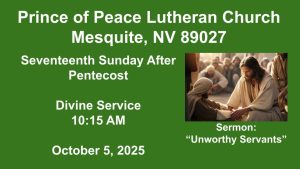
We are surrounded by “destruction and violence” (Hab. 1:3) because of the Law “is paralyzed, and justice never goes forth” (Hab. 1:4). In fact, the Law cannot rescue us from our enemies; it is our fiercest enemy of all. Therefore, not by sight, experience or feeling, nor by works, “the righteous shall live by his faith” (Hab. 2:4). “Temptations to sin are sure to come” (Luke 17:1), but as often as we sin, the LORD rebukes us, turns us to repentance and forgives us. We pray that He would thus “increase our faith” (Luke 17:5). And indeed, He does! Though we are His “unworthy servants” (Luke 17:10), He prepares His Supper for us, dresses us properly and gives us His body and blood to eat and drink. He appoints pastors for us, “by the will of God according to the promise of the life that is in Christ Jesus” (2 Tim. 1:1). For the Gospel brings “life and immortality to light” (2 Tim. 1:10). This we believe. Therefore, “follow the pattern of the sound words that you have heard,” by which He guards you “in the faith and love that are in Christ Jesus” (2 Tim. 1:13).
